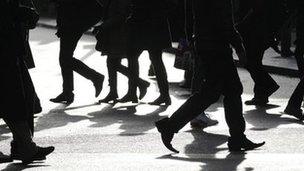No 10 considering curbs to tackle 'benefit tourism'
- Published
- comments

The restrictions on the movements of Romanians and Bulgarians expire at the end of 2013
Government plans to clamp down on "benefit tourism" could see both Britons and immigrants affected by changes to the rules on entitlement.
Ministers are looking to limit access to benefits, health care and housing when freedom to work controls on Romanians and Bulgarians end.
The detail of how changes might differ from current rules is not yet clear.
Downing Street said the curbs were being considered in response to "widespread public concern".
The PM's official spokesman said there was particular concern about the pressure created by migrants on local services, housing and the health service.
He declined to give any details about specific measures, or say whether the government was poised to introduce an "entitlement card" to limit access to the health service.
The measures would be announced in due course, he said.
BBC political editor Nick Robinson said the government was drawing up a package of measures designed to bring the UK into line with policies in other European member states already deemed legal by the European Court of Justice.
Councils will be urged to use new powers to give priority on council house waiting lists to those with local connections - whether born, educated or with relatives in their area - which could make it harder for outsiders to get housing.
Ministers are also examining the possibility of linking some benefits to contributions, which would have the effect of excluding new arrivals from eligibility.
'Forecasts difficult'
On Sunday, Foreign Secretary William Hague told the BBC people should not be attracted to the UK just by the benefits available and "benefit tourism" had to end.
He said ministers wanted to remove "artificial, perverse incentives" to come to the UK.
One immigration pressure group estimates 50,000 people will move to the UK every year from Romania and Bulgaria once the movement restrictions expire at the end of the year, but Mr Hague said any attempt to estimate the number would be "guesswork".
William Hague: "There is no magical secret [immigration] figure"
People from Romania and Bulgaria have been free to live in the UK and anywhere else in the EU since the countries joined the EU in 2007, but in the UK they have either had to apply for one of the limited work permits available, be self-employed, or work in specific jobs such as seasonal agricultural or as domestic servants.
Under EU rules, these temporary restrictions must come to an end at the beginning of 2014, after which Romanian and Bulgarian migrants will have the same rights to live and work in the UK as those of other EU countries, which will give them access to benefits and the NHS.
Ministers say the impact of the temporary work restrictions, and the fact that eight other EU countries are also ending their restrictions at the same time as the UK, make forecasting the number of Romanian and Bulgarian migrants who might come to the UK difficult.
When the first wave of former East European states joined the EU in 2004, the UK was one of just three existing members that did not bring in any temporary work restrictions - instead the UK introduced a Worker Registration Scheme to prevent "benefit tourism" by EU migrants coming to the UK for less than a year and claiming benefits.
For Labour, shadow immigration minister Chris Bryant said: "Managing immigration in a fair way is really important. Yet what we are getting from the Government is just an unseemly reaction to threats from their backbenches.
"In a panicked reaction to Eastleigh they are briefing anything and everything they can think of that they are looking at for the future, instead of properly considered, substantive and deliverable proposals that work for everyone."
- Published3 March 2013
- Published20 February 2013
- Published13 January 2013